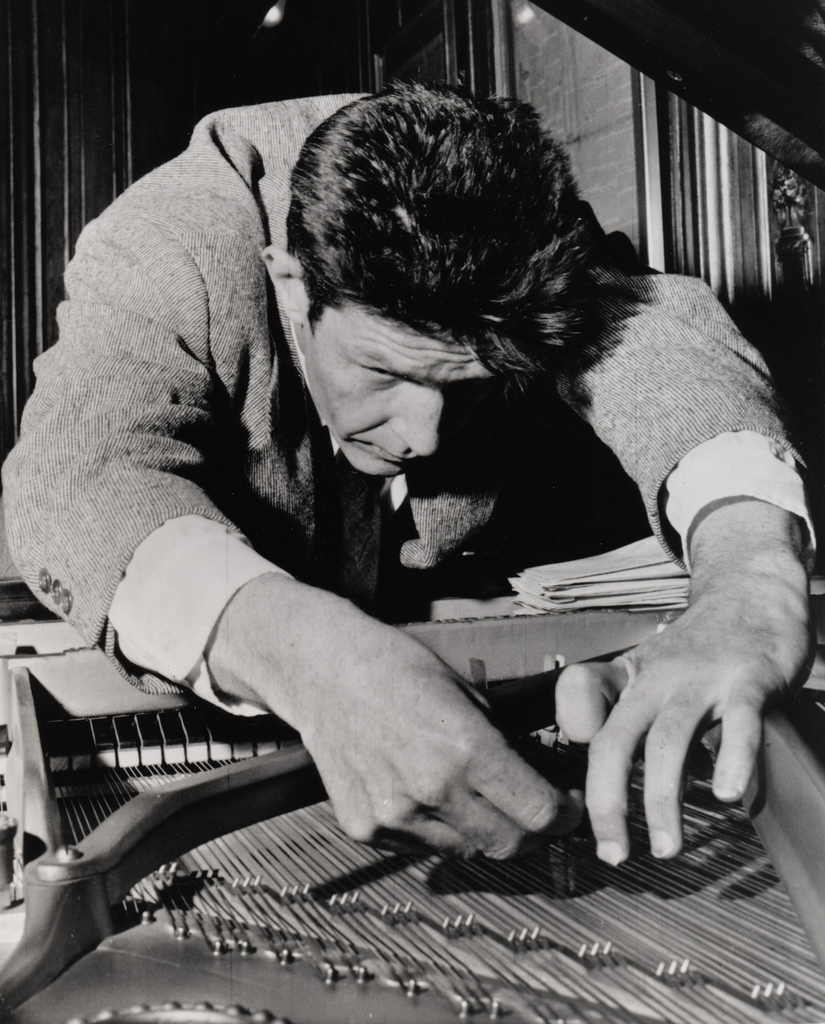I’ve just had a press release announcing that Mark-Anthony Turnage’s anti-Thatcher opera, Greek, is to have its first revival for ten years in the English heartland festival at Cheltenham.
I wonder what they’ll make of it in the shires.
Also on the cards is the concerto debut of wild-lad pianist, James Rhodes, and a kooky little sub-theme on the connections between maths and music from Pythagoras to Steve Reich.
Press release follows:
Cheltenham Music Festival, one of the UK’s most established and well-loved music festivals, announces its programme for 2011. The programme features top-notch performers, mainstage classics and cutting-edge contemporary music – all in a variety of stunning locations in and around this beautiful Cotswolds town.
Highlights of this year’s festival include:
- Evelyn Glennie gives the world premiere of a new percussion concerto by Joseph Phibbs that celebrates cocktails from around the world – a cocktail shaker will inevitably be part of the proceedings!
- From Pythagoras to the avant-garde, the Festival delves into the connections between music and maths, building on the success of the Science Festival tie-up, Sound Mind, in 2010.
- A special percussion weekend features not just Evelyn Glennie, but Graham Fitkin’s new band Fitkin and Steve Reich’s minimalist masterpiece from 1971, Drumming, played by the Colin Currie Ensemble.
- Other premieres include a new saxophone quartet by Gavin Higgins, Martin Butler’s Nonet, Edward Rushton‘s new twist on the popular mythical story of Pandora, and a piano quartet by RPS Composition Prizewinner Charlotte Bray
- Performance of Mark-Anthony Turnage‘s controversial debut opera Greek by Music Theatre Wales. A startling yuppy era retelling of the Oedipus story, in its first production in the UK for ten years.
- A taste of renaissance Spain in Gloucester Cathedral with award-winning Stile Antico. Music by Victoria, Morales, Guerrero and Palestrina will mark the 400th anniversary of thedeath of composer Tomás Luis de Victoria.
- Performances by exciting young artists including pianist James Rhodes in his concerto debut, a Dvo?ák chamber music double-bill featuring cellist Natalie Clein, and a performance from one of classical music’s hottest new properties, guitarist Milos Karadaglic.
- Wagner, Brahms and Strauss’ Four Last Songs from the London Philharmonic Orchestra, Vladimir Jurowski and Amanda Roocroft, and an all-Russian programme from theBournemouth Symphony Orchestra, Kirill Karabits and pianist Boris Giltburg.
The full programme will be announced in the spring. More information can be found at www.cheltenhamfestivals.com/music/
Ends
I’ve just had a press release announcing that Mark-Anthony Turnage’s anti-Thatcher opera, Greek, is to have its first revival for ten years in the English heartland festival at Cheltenham.
I wonder what they’ll make of it in the shires.
Also on the cards is the concerto debut of wild-lad pianist, James Rhodes, and a kooky little sub-theme on the connections between maths and music from Pythagoras to Steve Reich.
Press release follows:
Cheltenham Music Festival, one of the UK’s most established and well-loved music festivals, announces its programme for 2011. The programme features top-notch performers, mainstage classics and cutting-edge contemporary music – all in a variety of stunning locations in and around this beautiful Cotswolds town.
Highlights of this year’s festival include:
- Evelyn Glennie gives the world premiere of a new percussion concerto by Joseph Phibbs that celebrates cocktails from around the world – a cocktail shaker will inevitably be part of the proceedings!
- From Pythagoras to the avant-garde, the Festival delves into the connections between music and maths, building on the success of the Science Festival tie-up, Sound Mind, in 2010.
- A special percussion weekend features not just Evelyn Glennie, but Graham Fitkin’s new band Fitkin and Steve Reich’s minimalist masterpiece from 1971, Drumming, played by the Colin Currie Ensemble.
- Other premieres include a new saxophone quartet by Gavin Higgins, Martin Butler’s Nonet, Edward Rushton‘s new twist on the popular mythical story of Pandora, and a piano quartet by RPS Composition Prizewinner Charlotte Bray
- Performance of Mark-Anthony Turnage‘s controversial debut opera Greek by Music Theatre Wales. A startling yuppy era retelling of the Oedipus story, in its first production in the UK for ten years.
- A taste of renaissance Spain in Gloucester Cathedral with award-winning Stile Antico. Music by Victoria, Morales, Guerrero and Palestrina will mark the 400th anniversary of thedeath of composer Tomás Luis de Victoria.
- Performances by exciting young artists including pianist James Rhodes in his concerto debut, a Dvo?ák chamber music double-bill featuring cellist Natalie Clein, and a performance from one of classical music’s hottest new properties, guitarist Milos Karadaglic.
- Wagner, Brahms and Strauss’ Four Last Songs from the London Philharmonic Orchestra, Vladimir Jurowski and Amanda Roocroft, and an all-Russian programme from theBournemouth Symphony Orchestra, Kirill Karabits and pianist Boris Giltburg.
The full programme will be announced in the spring. More information can be found at www.cheltenhamfestivals.com/music/
Ends
Sending up the BBC’s reluctance to perform this year’s Christmas hit on its pop station, the Dutch asked composer Reinbert de Leeuw to perform it on prime time TV.
Here’s the masterpiece, in full and unedited:
http://www.youtube.com/watch?v=j-YFadXlw68
Sending up the BBC’s reluctance to perform this year’s Christmas hit on its pop station, the Dutch asked composer Reinbert de Leeuw to perform it on prime time TV.
Here’s the masterpiece, in full and unedited:
http://www.youtube.com/watch?v=j-YFadXlw68
The bicentenary of Robert Schumann’s birth had a pretty low-key reception in 2010, competing as it was against Chopin’s and against the recent 150th of Schumann’s death. Amid the recordings that came my way, one that pinned my ears back was the violinist Ilya Gringolts taking on the much-underplayed second sonata – and doing so with captivating zest.
http://www.onyxclassics.com/normanlebrecht/ONYX4053-5.mp3.zip
Schumann: Violin Sonata no.2 in D minor op.121 – II Sehr
lebhaft
Check the www.scena.org review:
Violin sonatas 1-3
(Onyx)
***

Ilya Gringolts and pianist Peter Laul take a sunny approach to the sonatas, a welcome change from the usual gloom and doom. The first two are mid-romantic meditations, the third a posthumous reconstruction. Gringolts is velvety and seductive in the softer passages, avoiding the pursuit of speed and showmanship, a natural storyteller.
The recording was issued on the Onyx label, a really interesting enterprise started five years ago by a pair of executive drop-outs from the crumbling corporate biz. Here is what I wrote about them at the time. I’m glad to see that many of their expectations (and mine) have been fulfilled. Enjoy Gringolts in Schumann. More to come in the festive days ahead.
The bicentenary of Robert Schumann’s birth had a pretty low-key reception in 2010, competing as it was against Chopin’s and against the recent 150th of Schumann’s death. Amid the recordings that came my way, one that pinned my ears back was the violinist Ilya Gringolts taking on the much-underplayed second sonata – and doing so with captivating zest.
http://www.onyxclassics.com/normanlebrecht/ONYX4053-5.mp3.zip
Schumann: Violin Sonata no.2 in D minor op.121 – II Sehr
lebhaft
Check the www.scena.org review:
Violin sonatas 1-3
(Onyx)
***

Ilya Gringolts and pianist Peter Laul take a sunny approach to the sonatas, a welcome change from the usual gloom and doom. The first two are mid-romantic meditations, the third a posthumous reconstruction. Gringolts is velvety and seductive in the softer passages, avoiding the pursuit of speed and showmanship, a natural storyteller.
The recording was issued on the Onyx label, a really interesting enterprise started five years ago by a pair of executive drop-outs from the crumbling corporate biz. Here is what I wrote about them at the time. I’m glad to see that many of their expectations (and mine) have been fulfilled. Enjoy Gringolts in Schumann. More to come in the festive days ahead.
Idealists the world over will be aware by now that John Cage’s posthumous bid to launch a Christmas number one was defeated by the X-Factor machine and other forces of darkness.

Still, against overwhelming odds, the release of 4’33” reached the creditable – indeed, amazing – height of #21 in the UK pop charts – only to run in to a wall of resistance at BBC Radio 1, where producers and DJs refused to play the track in full on their chart shows.
Challenged by Bob Dickinson, one of the Cage activists, a BBC executive composed the following excuse, exquisite in its public-service prevarications. In order to avoid another Wikileaks hoo-ha, certain details have been withheld.
“Please let me assure you that we did carefully consider the option to play the track in full at a production meeting last week. The final decision was that if the track entered the Top 20 we would play it unedited, however it entered at No. 21 and as… a result a short extract was played instead.
… In reality only 15,716 people actually paid for the track compared to the audience for the Official Chart Show which is at least 1.4 million. We decided that while most of them would like to know where the single charted they would be significantly less interested in hearing 4 minutes and 33 seconds of near silence. I completely understand your frustration, but in this case the decision was about pleasing the majority of BBC Radio 1’s listeners rather than a minority”
Idealists the world over will be aware by now that John Cage’s posthumous bid to launch a Christmas number one was defeated by the X-Factor machine and other forces of darkness.

Still, against overwhelming odds, the release of 4’33” reached the creditable – indeed, amazing – height of #21 in the UK pop charts – only to run in to a wall of resistance at BBC Radio 1, where producers and DJs refused to play the track in full on their chart shows.
Challenged by Bob Dickinson, one of the Cage activists, a BBC executive composed the following excuse, exquisite in its public-service prevarications. In order to avoid another Wikileaks hoo-ha, certain details have been withheld.
“Please let me assure you that we did carefully consider the option to play the track in full at a production meeting last week. The final decision was that if the track entered the Top 20 we would play it unedited, however it entered at No. 21 and as… a result a short extract was played instead.
… In reality only 15,716 people actually paid for the track compared to the audience for the Official Chart Show which is at least 1.4 million. We decided that while most of them would like to know where the single charted they would be significantly less interested in hearing 4 minutes and 33 seconds of near silence. I completely understand your frustration, but in this case the decision was about pleasing the majority of BBC Radio 1’s listeners rather than a minority”



